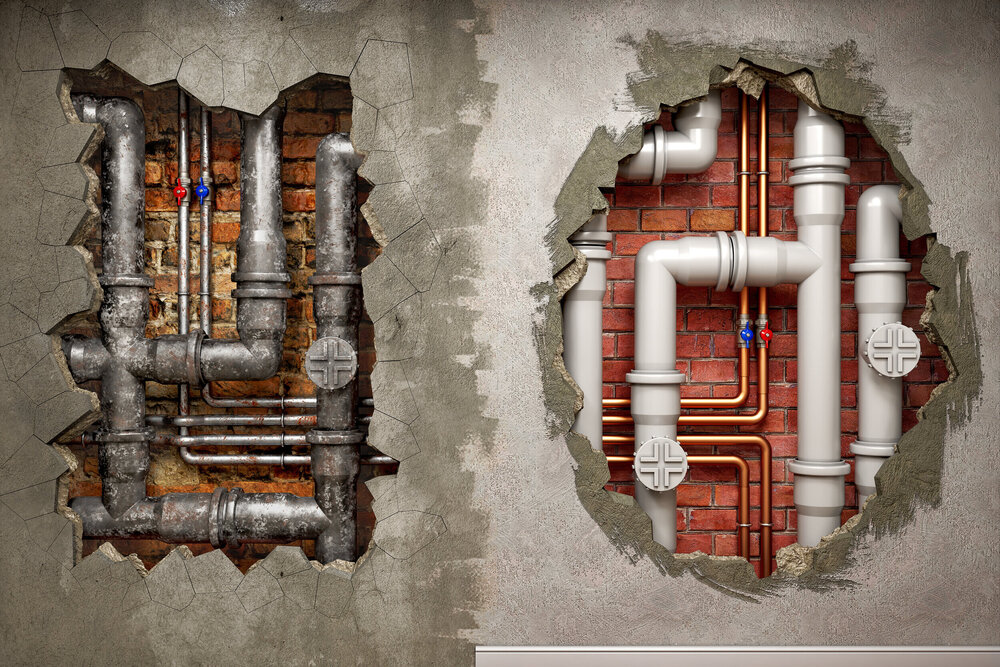Pex Vs. Copper Pipes: Which Is Best For My Home
As the world advances its living standards and focuses on sustainable technology, the people of the U.S. have always preferred having a healthy and sustainable water supply in their homes. Hence, “PEX vs.Copper pipe, which is better for my home?” has always been asked and searched for.
When living in a big city, it is best not to think about where the water coming out of your faucet has come from. Of course, it’s clean and safe, but what about the pipes the water has passed through to arrive in your kitchen?
When it comes to pipes needed in your home, whether you’re renovating or building a new home, PEX Pipes have always been in the first place and most recommended by professional plumbers for homes.
(The usage of PEX and copper piping for water supply depends on the demand & the type of the plumbing project.)
Pex Vs Copper: Which One Is The Best Choice For Homeowners
What to choose from Copper to PEX is a question mainly asked by the people willing to replace the water lines in their homes. Hence, it is important to know about the pros and cons of PEX and copper pipe. Below, we have mentioned the points, including topics such as the cost of PEX vs. Copper, that will help you to understand which water pipe will be better for you.
What Is Pex Pipe & Why To Choose It Over Copper Pipe
PEX, or as it’s formally known, cross-linked polyethylene, is piping constructed from polyethylene (plastic) that is highly durable because it has been formed with extraordinarily strong cross-links. PEX has been around since the 1930s, but it wasn’t until improved production methods in the 1980s that it became a viable alternative to its copper counterparts.
Why Choose Pex
- Since PEX is a synthetic material, it doesn’t have as many environmental implications as copper piping, constructed using a non-renewable resource.
- While many newer copper pipes are made from recycled copper, they are still far more costly than PEX. Copper prices have gone up in recent years, and as a result, PEX has become increasingly common when it comes to residential and commercial plumbing.
- Most people prefer Pex over copper because there is very little risk of leaks with Pex Tubing.
- Pex also doesn’t degrade like copper; higher PSI rating freezing pipes will still burst, but Pex can handle freezing temperature cold water more than copper.
- Pex is also DIY-friendly and is very easy to install in houses.
What Is Copper Pipe & Why Choose It Over Pex
Copper Piping is a type of tube-like material made from copper. It includes a red-brown metal added with the chemical symbol Cu, and it is referred to as atomic number 29. Copper piping is replaced by Pex Piping due to its prone nature to erosion-corrosion, especially when used to convey drinking water in homes. It also gets affected by other types of corrosion due to the reaction of water ions with copper ions.
Why Choose Copper
- A key benefit of copper piping is that it lasts longer, and in many instances, the manufacturer will offer an amazing 50-year warranty on newly installed copper pipes.
- While PEX also has a long shelf life, copper is the clear winner when it comes to durability. If you live in an area prone to natural disasters, copper is also the front-runner since even in the event of severe damage, your copper pipes will often come through the incident unscathed.
- Copper Pipe stays strong for long and there is no risk of a water leak in houses, and will also prevent any wall damage which can cost you unwanted extra money.
- Copper plumbing pipes have proven to be incredibly durable. This piping material is able to handle the pressure of up to 1000 psi. The average lifespan of copper piping will range from 50 – 70 years depending on variables such as the surrounding climate, water quality, and operating patterns.
- Copper Pipes are useful for a big building where there is a huge amount of water supply is required.
It’s never an easy decision to choose between vs Pex vs.copper plumbing, but your options will vary depending on your needs. If you need to install new piping, ask your contractor or plumber about the benefits of both options.
Is Pex Better Than Copper
Most homeowners will opt for the ease and reduced cost of PEX. It can also result in more substantial water pressure than copper, since PEX is usually installed with less abrupt turns inside the wall, meaning that the water doesn’t have to slow down so much when it’s making its way to your shower.
PEX is also advantageous in parts of the world that suffer from harsh winters since it’s less prone to cracking from frozen water than copper. Pex Tubing is cheaper than Copper when you compare the cost of PEX vs. copper because of its low labor installation. Pex tubing is becoming the first choice of the industry standard.
Maintenance & Care
From copper to PEX, no matter what type of pipes you have in your plumbing system, they will require regular care and maintenance to ensure longevity. Both PEX and copper pipes can last long if taken care of properly. Proper maintenance can help you avoid issues such as leaks and corrosion and ensure optimal water pressure in the house.
Pex Pipe Maintance & Care
PEX pipes have gained popularity due to their resistance to freezing and longevity. Here are some tips to maintain them:
Insulation: PEX piping is resistant to freezing, but insulating your plumbing in colder climates is still essential.
Limit Exposure to Hot Temperature: PEX plumbing has a maximum heat exposure limit; if the water temperature exceeds that limit, the piping can be damaged.
Ensure No Chemical Exposure: PEX plumbing can degrade if exposed to certain chemicals, so it is essential to limit exposure.
Avoid Direct Sunlight: PEX piping can deteriorate due to exposure to UV rays. Do not store them in direct sunlight, and ensure no sun exposure.
Copper Pipe Maintance & Care
Copper pipes are a part of many homes’ plumbing systems, requiring regular maintenance and care to last a long time. Here is what you can do to ensure their longevity:
Watch Out For Green Spots: Green spots on your copper pipes can indicate corrosion. If you see them, clean them with hot water and have a plumber investigate the cause.
Avoid Harsh Cleaners: Do not use abrasive cleaners on your copper piping, as they can damage your pipes.
Soft Water Treatment: Extra soft water can induce pinhole leaks in your piping. Consider using a calcite neutralizer for your plumbing system to avoid this issue.
Insulation: Copper piping can be damaged by freezing, so it is essential to insulate pipes for colder climates.
How Long Do Pex Pipes Last
Long-term testing programs have shown that PEX Pipes can last for 100 years before they need to be replaced. Copper pipes, on the other hand, need to be replaced every few years due to corrosion and leaks; simply, PEX pipes last longer than Copper Pipes. When you look at this from the perspective of the cost of PEX vs. copper, PEX gives you a higher ROI. Additionally, installing PEX in Seattle is more accessible than PVC, CPVC, or Copper.
Pex Piping Vs Copper: Choose The Best Water Supply Line For Your House
No matter which type of piping you decide to install in your home, it’s unlikely that it will still be there in 150 years’ time, so you really need to consider what’s best now for you and your family, as well as your bank balance. Both options have their advantages, but with soaring copper prices and increased environmental concern about the ongoing supply of the material, it’s little wonder that PEX will likely become the most used material in a few short years.

Call The Professionals
Call Fischer Plumbing Right Away And Get The Best Sewer Line Repair Service At Your Doorstep.
FREQUENTLY ASKED QUESTIONS
PEX plumbing is a safe option for your plumbing since it is reliable and resistant to freezing temperatures. As long as you keep it away from chemicals and direct sunlight, it cannot contaminate water and is a safe type of piping to use.









